
The Duchess of Sussex criticized the “caricaturization” of women “as overly sexualized or aggressive” in a new episode of her Archetypes podcast.
The series has been on a four-week hiatus after the Queen’s death.
In a new episode exploring the “Dragon Lady” stereotype with journalist Lisa Ling and comedian Margaret Cho, Meghan, 41 — a former actress on the legal drama Suits — mentioned the two-decade-old films.
The 2002 Austin Powers in Goldmember film features Japanese women Fook Mi – played by Diane Mizota – and Fook Yu, played by Carrie Ann Inaba.
The characters have been criticized for symbolizing Asian women sexually, and at one point, Powers — a comedic spy who is constantly portrayed on the hunt for sexual conquest — is seen with a list called “threesome with Japanese twins”.
In Tarantino’s 2003 cult hit Kill Bill, Lucy Liu plays the murderously violent Yakuza leader O-Ren Ishii.
The character was described by writer India Roby as a stereotypical Dragon Lady who “uses her sexuality as a powerful tool for manipulation, but is often emotionally and sexually cold and threatening masculinity”.
Meghan, who abdicated duties with husband Prince Harry to move to California, her podcast started by talking about her experience growing up in Los Angeles, which was “full of culture” that she had a “true love” for.
The royal said she was not aware of the stigmas faced by women of Asian descent until many years later.
Prince Harry and Meghan Markle at Kensington Palace, London
/ FATHERShort clips from both blockbusters were played to illustrate Meghan’s point.
She said: “Movies like Austin Powers and Kill Bill often presented these Asian female characters as overly sexualized or aggressive.
“And it’s not just those two examples, there are many more.”
Quentin Tarantino was inspired by 1970s martial arts and samurai movies, along with the Japanese revenge film Lady Snowblood.
Later, the Duchess went further on the concept, telling Cho: “The Dragon Lady, the East Asian temptress whose mysterious foreign allure has been described as both seductive and deadly.
“This has seeped into a lot of our entertainment. But this toxic stereotyping of women of Asian descent doesn’t stop once the credits roll.”
In her introduction, Meghan spoke of visiting a Korean spa with her mother Doria Ragland as a teenager, adding, “It’s a very humbling experience for a girl going through puberty because you enter a room with nine-year-old women. up to maybe 90, all walking around naked and waiting for a body scrub on one of these tables all lined up.
“All I wanted was a bathing suit. Once I got over that adolescent embarrassment, my mom and I went upstairs, sat in a room and drank a steaming bowl of the tastiest noodles.”
Journalist Ling told Meghan that when she was a broadcaster on Channel One, she was named a hot reporter on Rolling Stone’s Hot List, but faced racial abuse in the aftermath.
“Someone at work cut that article out, squinted over the eyes and wrote ‘yes, good’ and then put it back in my mailbox,” she said.
Meghan, who accused an unnamed member of the royal family of racism in her interview with Oprah Winfrey, replied, “Oh my god.”
Cover of Archetypes featuring the Duchess of Sussex
/ FATHERLing added: “It was like every grain of excitement I possessed just melted away. It was so devastating that someone I would see every day at work, where we should feel comfortable, had those feelings about me and had the audacity to make it racist.”
Korean-American comedian Cho spoke of enjoying life to the full, saying, “You really have to enjoy the time you have because it’s… it’s not very long, you know, it goes by very quickly.”
Meghan replied: “Yeah… it’s so true.”
The pair also exchanged applause, with Meghan Cho saying she loved her new movie, Fire Island.
Cho told the Duchess: “We actually talked a lot about you on set. We were just admiring you, so much.”
Meghan replied: “Oh, really? … I really appreciate that.”
She added: “Honestly, I’m excited. When I got downstairs I was like ‘I’m talking to Margaret Cho this morning’.”
She urged her podcast listeners to be their “best and true selves”.
“Just be yourself, no matter what social framework or archetype or a loud voice coming from a small place tells you you should be,” she said.
“Be yourself – your full complete, very layered, sometimes weird, sometimes great, but always best and true self. Just be you. You are so much bigger than anyone else archetype.”
